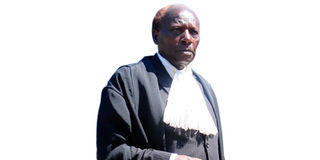On confusing story of Lady Justice Tibatemwa

Prof George W. Kanyeihamba
What you need to know:
In fact, earlier after becoming a judge of the Supreme Court, my first Chief Justice Samuel WW Wambuzi nominated me to attend annually the Dublin forum for senior African judges where I served for nearly 10 years.
Daily monitor of Monday, October 7, published a story in which the Judicial Service Commission tasked Lady Justice Lillian Tibatemwa to explain how she came to be sworn in as a Justice of the Court of Appeal of the Republic of Seychelles.
On the face of it, it appears reasonable considering that she is a full-time lord justice of the Supreme Court of Uganda.
However, knowing the practice under which many Ugandan judges have been invited to assist our sister African countries, this needs an explanation from stakeholders.
As I write, there are several Ugandan judges working in foreign and international judiciaries. I may have been one of the earliest to do so, even though perhaps, on different criteria. I was a pioneer judge of the African Court of Justice and Human Rights on a part-time basis.
It is true that the African Union invited me through my Chief Justice, Benjamin Odoki. The African Union would have been happy for me to continue serving for another term, except some Ugandan authorities declined to support me again for reasons best known to themselves. They lacked patriotism because I had been slated by my colleagues in that court to be elected the next president of that court, which those who opposed my presence there did not consider as an honour to our beloved country.
In fact, earlier after becoming a judge of the Supreme Court, my first Chief Justice Samuel WW Wambuzi nominated me to attend annually the Dublin forum for senior African judges where I served for nearly 10 years.
When I was about to retire from the Supreme Court, the government of Seychelles graciously invited me to become their Chief Justice on a five-year contract. When I disclosed that I was soon to retire from the Ugandan Judiciary, they said they knew it and that was why they were appointing me on a contract so that I could help them to build and develop their own jurisprudence.
As I prepared to leave and take up my appointment, I was vetoed by a Ugandan with influence in Seychelles who thought that my candid opinions would not go well in that island republic. Fortunately, but unknown to him, I was substituted by Lord Justice Egonda Ntende who is a close friend of mine with whom we share a lot in jurisprudence and so I was so delighted.
It may be interesting also to note that when I was appointed to head a panel of Commonwealth eminent judges and jurists to investigate corruption in the Kenyan judiciary, or to head a commission of inquiry into the conflicts between the three arms of government in the Kingdom of Swaziland (now called Eswatini) under the auspices of the international commission of jurists.
Unless our Constitution has changed, the role of the Judicial Service Commission, its powers and duties are prescribed by the Constitution and I do not recall that reshuffling judges or consulting it on the secondment on different missions, including judges going or visiting other countries, is one of them.
It is, therefore, puzzling that there should be this keen interest by the Judiciary Service Commission in the complementary invitation of Justice Tibatemwa and in honour of Ugandan judicial acumen to be acting judge of Court of Appeal in Seychelles.
Prof Kanyeihamba is a retired Supreme Court judge.
[email protected]


